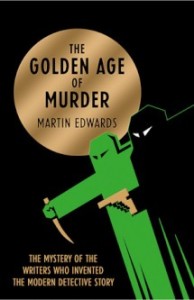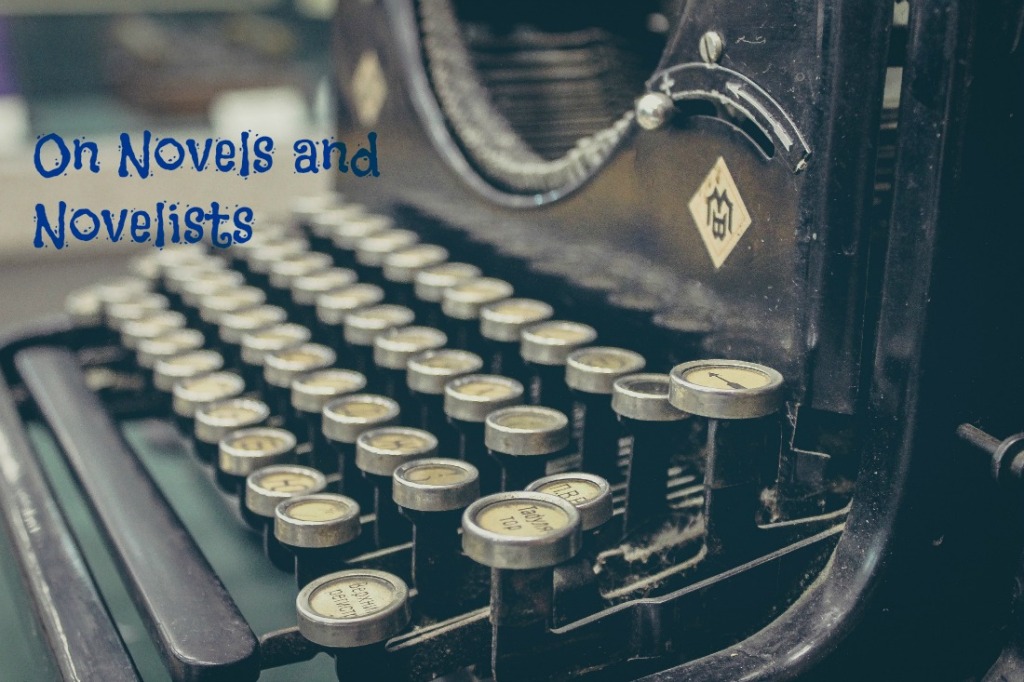How the Modern Detective Novel Was Born
 Here Martin Edwards, author of the new book The Golden Age of Murder: The Mystery of the Writers Who Invented the Modern Detective Story, gives a concise history of the development of the modern detective novel. Authors he discusses include the following: Edgar Allan Poe, Arthur Conan Doyle, G.K. Chesterton, E.C. Bentley, Agatha Christie, Freeman Wills Crofts, G.D.H. Cole, Henry Wade, Ed McBain, Anthony Berkeley, Patricia Highsith, Margaret Millar, Ruth Rendell, Sophie Hannah, Dorothy L. Sayers, and J.K. Rowling (writing as Robert Galbraith).
Here Martin Edwards, author of the new book The Golden Age of Murder: The Mystery of the Writers Who Invented the Modern Detective Story, gives a concise history of the development of the modern detective novel. Authors he discusses include the following: Edgar Allan Poe, Arthur Conan Doyle, G.K. Chesterton, E.C. Bentley, Agatha Christie, Freeman Wills Crofts, G.D.H. Cole, Henry Wade, Ed McBain, Anthony Berkeley, Patricia Highsith, Margaret Millar, Ruth Rendell, Sophie Hannah, Dorothy L. Sayers, and J.K. Rowling (writing as Robert Galbraith).
Edwards places the detective novel within the changing social, historical, and cultural characteristics of its development and argues:
Golden Age novels reflected the times during which they were written. Inevitably, many of the attitudes on display are different from those of the twenty-first century. But for too long, even the best of these books have suffered unfairly from critical prejudice. Hugely enjoyable in their own right, they give a fascinating insight into a vanished world. What is more, they set the pattern for crime fiction for decades to come. The time is ripe to rediscover the Golden Age of Murder.
When Did Books Get So Freaking Enormous? The Year of the Very Long Novel
In an article from last month Boris Kachka admits “it’s tempting to proclaim this the era of the Very Long Novel (VLN).” The classic example of the recent VLN era is David Foster Wallace’s 1,079-page opus Infinite Jest, published in 1996. As more recent examples of such tomes he cites Eleanor Catton’s The Luminaries and Donna Tartt’s The Goldfinch. Another illustration of this trend is the current emphasis on series works such as the Harry Potter collection and Game of Thrones.
Yet long books are really nothing new, Kachka points out (think Eliot’s Middlemarch and Tolstoy’s The Brothers Karamazov). Here’s one possible explanation for the current crop of VLNs:
“People seem to be seeking wholly immersive experiences,” says Knopf publicity director Paul Bogaards. “They’re binge-watching, they’re cooking from scratch, going on ecotours. And there’s no more immersive experience than reading a good long book.”
Another possible explanation is the concept of “_World-building_, a term once exclusive to physicists and game designers, [that] is now on the tip of every book publicist’s tongue.” Bigger books create bigger worlds. Both individual VLNs and series VLNs parallel the growing obsession with binge-watching multiple episodes of television series and online-created content.
This whole discussion reminds me of a scene from the film Amadeus, about the life of Mozart. When someone criticizes the composer for using too many notes, he asks, “Exactly which notes would you have me leave out?”
I don’t mind long books. In fact, I read eagerly through The Goldfinch by Donna Tartt, enthralled until the very last word. What I don’t like is a long book that’s longer than it needs to be. I thought Moo, Jane Smiley’s satirical take on the small world of land-grant academia, should have been cut by about one-third.
What about you? Do you like to read long books? Are there any VLNs that you’ve particularly liked or hated? Let us know in the comments section.
Can Reading Make You Happier?
Novelist Ceridwen Dovey describes personal experience with bibliotherapy, or reading by prescription. Initially skeptical, Dovey discovered:
The insights themselves are still nebulous, as learning gained through reading fiction often is—but therein lies its power. In a secular age, I suspect that reading fiction is one of the few remaining paths to transcendence, that elusive state in which the distance between the self and the universe shrinks. Reading fiction makes me lose all sense of self, but at the same time makes me feel most uniquely myself.
Along the way Dovey provides a short history of bibliotherapy:
The practice came into its own at the end of the nineteenth century, when Sigmund Freud began using literature during psychoanalysis sessions. After the First World War, traumatized soldiers returning home from the front were often prescribed a course of reading… . Later in the century, bibliotherapy was used in varying ways in hospitals and libraries, and has more recently been taken up by psychologists, social and aged-care workers, and doctors as a viable mode of therapy.
And here are a couple of lists of reading recommendations, if either of these topics grabs you.
10 Books to Read If You’re Not Traveling This Summer
Writer Emma Straub’s most recent novel, The Vacationers, is set in Mallorca. Because a “good book is the cheapest form of transportation there is,” Straub here recommends some books you can read if you’re not traveling this summer—or even if you are.
10. In the Woods by Tana French
9. The Fun of It, Stories from the Talk of the Town edited by Lillian Ross
8. Magic for Beginners by Kelly Link
7. Savage Beauty by Nancy Milford
6. Gentlemen Prefer Blondes by Anita Loos
5. The Interestings by Meg Wolitzer
4. Going Clear by Lawrence Wright
3. Arcadia by Lauren Groff
2. The Stranger’s Child by Alan Hollinghurst
1. Bad Marie by Marcy Dermansky
About Straub’s 10th pick, In the Woods by Tana French: This is the first book in what is known as French’s Dublin Murder Series. I did not particularly like it and almost didn’t read the subsequent novels. But a good review for the second book in the series made me give it a try, and I’ve read the rest and like them all. These books are related in that each one focuses on a different character of a Dublin murder squad, but each book is self-contained and can be read on its own.
10 Best Noir Novels
I like noir novels as much as the next reader, so I was surprised that I had never even heard of any of these books. Read why Ken Bruen, whose own most recent noir novel is _Green Hell-, singles out these titles:
10. Dark Passage by David Goodis
9. Sing a Song of Homicide by James R. Langham
8. Cold Caller by Jason Starr
7. The Lucky Stiff by Craig Rice
6. A Swollen Red Sun by Matthew McBride
5. The Shark-Infested Custard by Charles Willeford
4. He Died with His Eyes Open by Derek Raymond
3. The Fever Kill by Tom Piccirilli
2. The Whisperer by Donato Carrisi
1. Killing Suki Flood by Rob Leininger

